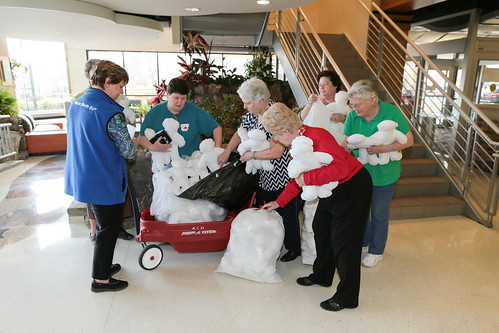Arkansas EHC offers skills, service, lifelong connections
July 6, 2018
By Jessica Wesson
U of A System Division of Agriculture
Fast Facts
- EHC offers many benefits to members
- Organization looking to expand membership to new age group
(840 words)
(Newsrooms – with file art of AEHC projects at https://flic.kr/s/aHskwqzuKb )
Download Word version
LITTLE ROCK – An organization of volunteers whose feats include helping Arkansans recover following the great Mississippi River flood of 1927 and encouraging childhood vaccination statewide during the 1980s is looking forward to new generations of members who will keep its educational and service legacy alive.
The Arkansas Extension Homemakers Council was born in 1912 in Mabelvale, Arkansas, and has grown into one of the largest consumer education and volunteer service organizations in the state. It was begun by extension home demonstration agents to help homemakers make the best use of their resources, whether money, gardens, clothing or furniture. Today it’s operated under the Cooperative Extension Service, part of the University of Arkansas System Division of Agriculture.

While times have changed, the need to manage personal resources hasn’t.
Shea Wilson, Prairie County extension agent for the Division of Agriculture, said that young people need a source for research-based information as opposed to the modern methods of gathering information.
“There is so much information out there,” she said. “We have access to Pinterest and different things all the time. Extension is different because it is research based and reliable. Getting young homemakers involved in family consumer science is important because they will get the facts. Extension doesn’t try to sell a product, it’s just basic life skills.”
Deborah Teague, EHC Delta District director said that EHC became a prevalent channel of important information.
“EHC is one of the best things that has happened to rural Arkansas,” Teague said. “It has allowed people who have techniques and information that could improve lives to share that with others and make a difference.”
EHC offers an open door to make friends and lifelong connections, no matter what age you are.
“My favorite part of EHC is getting to spend time with people who share a common interest and learning and teaching new skills to others. I also really enjoy doing all my community service projects,” said Lacey Flory, Washington County EHC member.
“My favorite thing about the EHC is the camaraderie between the women. It’s just awesome. If you got in trouble, you could just call one of your EHC girls, and they’d be right there,” said Stoll.
There are challenges for an organization like AEHC.
“It’s harder to get younger members in because they are doing so many things,” she said. “Today’s culture is a ‘throw-it-away’ culture, not a ‘fix-it’ culture. If young women today can’t buy clothes that fit, then they don’t buy it. If they don’t get it altered at the store, then they won’t buy it.”
Life skills, strengthening communities
Laura Hendrix, associate professor of family and consumer science for the Division of Agriculture and AEHC state adviser, said that AEHC serves the Cooperative Extension Service as a unique outlet to relay important messages.
“Through AEHC, the Cooperative Extension Service improves quality of life for Arkansans and strengthens Arkansas communities,” she said. “Members learn critical life skills, have opportunities for personal growth, find a place to connect with others, and discover ways to serve in their communities.”
EHC is built on three pillars: education, leadership and community service and the skills taught to EHC members are very relevant today.
“For example, in the area of personal finance, members learn to manage credit wisely, create a spending plan, complete a net worth statement, and to save and invest. In nutrition, members learn to plan and prepare healthy meals,” said Hendrix.
According to Hendrix, the benefits of EHC are unique and varied.
“In addition to gaining knowledge and learning new skills, members highlight the opportunity to connect with others and feel plugged in to their community – a sense of belonging,” said Hendrix. “Connection and belonging are important for well-being and sometimes more elusive than standard measures of wellness such as blood pressure and healthy weight.”
EHC changed as time has evolved. Elaine Stoll, an EHC member, told about how she has seen the change in this organization.
“I used to walk barefooted with my mother for three miles to club meetings,” she said. “Over the years the EHC has become more focused on community leadership and the format of the education has changed. You have to change with the times.”
Stoll served as her local club’s president, county president, the state president and on a planning committee. Stoll will receive a milestone award for 50 years of membership next year.
Stoll believes that membership should be expanded to ensure a bright future for EHC.
“There will be a lot more technology introduced, and hopefully we can expand our membership to younger people,” she said.
For more information about EHC visit www.uaex.uada.edu/ehc or contact your local county agent.
About the Division of Agriculture
The University of Arkansas System Division of Agriculture’s mission is to strengthen agriculture, communities, and families by connecting trusted research to the adoption of best practices. Through the Agricultural Experiment Station and the Cooperative Extension Service, the Division of Agriculture conducts research and extension work within the nation’s historic land grant education system.
The Division of Agriculture is one of 20 entities within the University of Arkansas System. It has offices in all 75 counties in Arkansas and faculty on five system campuses.
Pursuant to 7 CFR § 15.3, the University of Arkansas System Division of Agriculture offers all its Extension and Research programs and services (including employment) without regard to race, color, sex, national origin, religion, age, disability, marital or veteran status, genetic information, sexual preference, pregnancy or any other legally protected status, and is an equal opportunity institution.
# # #
Media Contact: Mary Hightower
Dir. of Communication Services
U of A System Division of Agriculture
Cooperative Extension Service
(501) 671-2126
mhightower@uada.edu